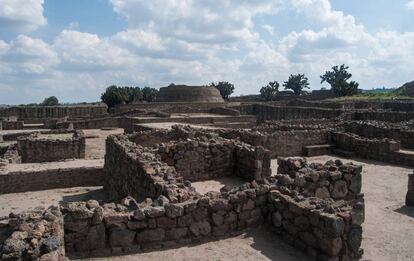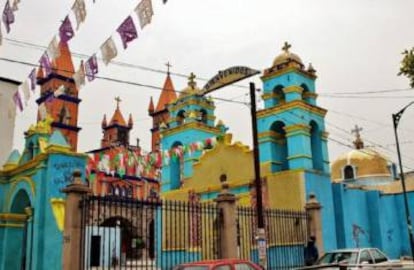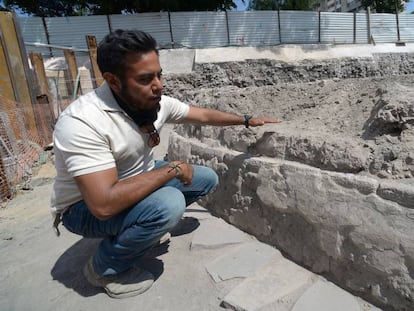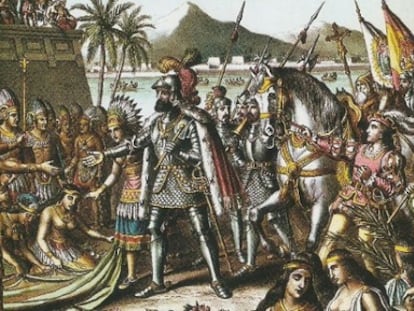Archeologists find signs of early democracy at Mexican site
Article in ¡®Science¡¯ describes Tlaxcala, a collective society where rulers were not born into power

It might be that the origins of democracy are not a purely European phenomenon, and that, on the other side of the Atlantic, long before the arrival of the Spanish, a Mexican city was already organizing itself in a collective way.

A group of archeologists working in Tlaxcala (Mexico) has found the remains of a society that was not ruled by absolute leaders who inherited power. Rather, according to an article published in Science magazine, whoever wanted to be a leader had to undergo a harsh initiation rite to prove their worthiness for the post. And inhabitants, who financed the community through their taxes, had the power to hold this leader to account.
The city, built around 1250, is located near modern-day Tlaxcala, in central Mexico. And it looks nothing like most Mesoamerican cities found to date. The Science article explains that typical cities like Tenochtitlan, where modern-day Mexico City now sits, were arranged around ¡°a monumental core of pyramids and plazas.¡± But in Tlaxcala, ¡°the plazas were scattered throughout every neighborhood, with no clear center or hierarchy.¡±
For a very long time within archaeology, we¡¯d been looking for markers of a king
Rita Wright, archeologist
Lane Fargher, the archeologist in charge of the project, believes that the senate was located inside a building that he found on the outskirts of town. Inside, around 100 people made key military and economic decisions.
Fargher, who works at the Cinvestav research institute in M¨¦rida (Mexico) and has conducted surveys in the area since 2007, believes he has discovered a type of society that many archeologists never thought had ever existed in the Americas: a republic.
¡°Twenty or 25 years ago, no one would have accepted it was organized this way,¡± he told Science.
In order to become members of the senate, candidates had to undergo harsh rituals that were described by a Spanish priest who visited Tlaxcala in the 16th century. According to his account, applicants tended to be soldiers back from war, whose first test entailed standing naked in the middle of a plaza while a crowd jeered and beat them. Those who successfully passed this trial were then taken to a temple for up to two years, where priests taught them the city¡¯s moral and legal code. Treatment included being whipped and variously tortured to prove their ability to govern. At the end of this period, successful candidates were rewarded by becoming part of the senate.

The researchers admit that this society was not a full democracy, but they say that it was ruled by a shared or collective power, that the economy rested on taxes, and that anyone could become a leader. Archeologists also note that there was a predominance of public spaces over luxury palaces, that local production was favored over imports, and that the gap between the elites and the commoners was much more narrow than in other contemporary civilizations.
The researchers also note that this collective, self-contained system was encouraged by the trade blockade imposed by the Mexica Empire (the Aztecs), whose own capital was just 100 kilometers from Tlaxcala.
The pre-Hispanic city of Tlaxcala is not the only place in Mexico where researchers have found a model of society that does not fit into the pattern of a despotic government. Scientists also talk about a site called Monte Alb¨¢n, the Zapoteca capital in modern-day Oaxaca. This culture flourished between the years 500 and 800, and did not leave behind the kind of ostentatious representations of its rulers so common in Olmec and classical Maya art.
The area is also devoid of palaces and royal tombs. Instead, authority symbols were more closely associated to the gods and the cosmos than to specific individuals.
¡°For a very long time within archaeology, we¡¯d been looking for markers of a king,¡± said Rita Wright, an archaeologist at New York University, in the Science article. But now researchers have a new theory to make sense out of the societies in the Americas that governed themselves in a different way.
Tu suscripci¨®n se est¨¢ usando en otro dispositivo
?Quieres a?adir otro usuario a tu suscripci¨®n?
Si contin¨²as leyendo en este dispositivo, no se podr¨¢ leer en el otro.
FlechaTu suscripci¨®n se est¨¢ usando en otro dispositivo y solo puedes acceder a EL PA?S desde un dispositivo a la vez.
Si quieres compartir tu cuenta, cambia tu suscripci¨®n a la modalidad Premium, as¨ª podr¨¢s a?adir otro usuario. Cada uno acceder¨¢ con su propia cuenta de email, lo que os permitir¨¢ personalizar vuestra experiencia en EL PA?S.
?Tienes una suscripci¨®n de empresa? Accede aqu¨ª para contratar m¨¢s cuentas.
En el caso de no saber qui¨¦n est¨¢ usando tu cuenta, te recomendamos cambiar tu contrase?a aqu¨ª.
Si decides continuar compartiendo tu cuenta, este mensaje se mostrar¨¢ en tu dispositivo y en el de la otra persona que est¨¢ usando tu cuenta de forma indefinida, afectando a tu experiencia de lectura. Puedes consultar aqu¨ª los t¨¦rminos y condiciones de la suscripci¨®n digital.










































